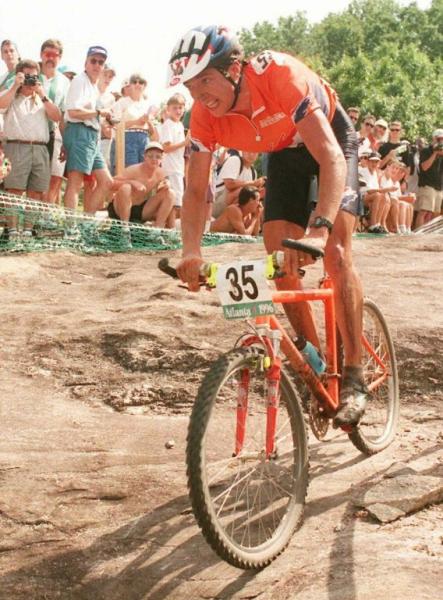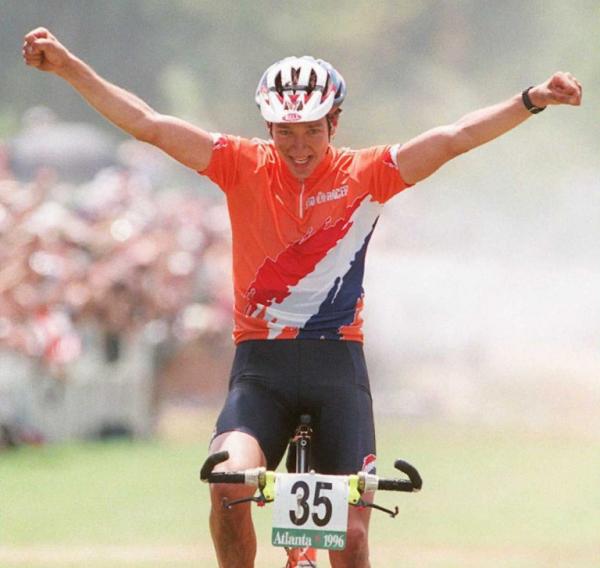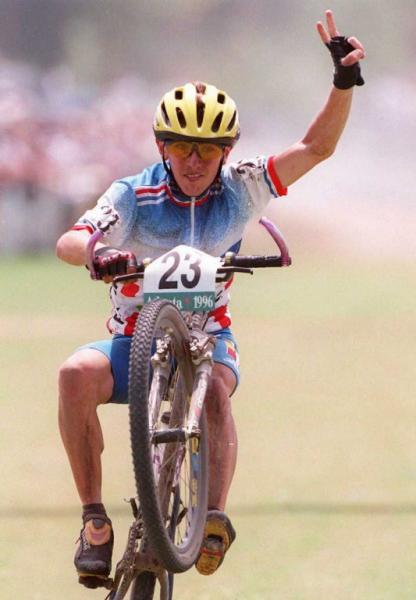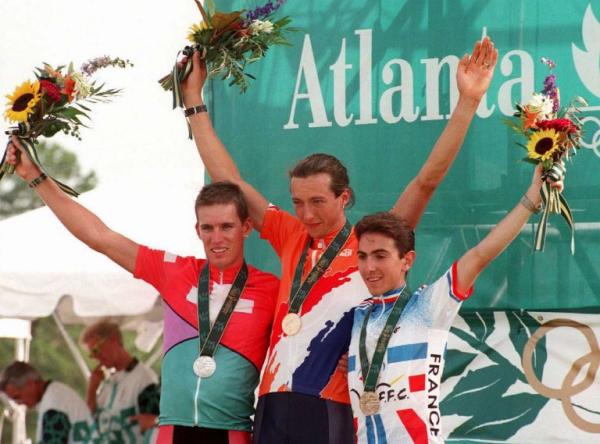Olympic Moments: 1996 - Mountain biking comes of age
Part 1: Brentjens wins gold in first Olympic MTB race




With just 37 days until the start of the London 2012 Olympic Games, Cyclingnews takes a look back at the first men's and women's Olympic mountain bike races.
Olympic Moments: 1992 - Boardman wins in Barcelona
Olympic Moments: 1948 - Godwin realises his dream
Olympic Moments: Indurain's last hurrah in Atlanta 1996
Olympic Moments: 1984 - Grewal edges Bauer in thriller
Olympic Moments: 2000 - Nothstein, the last great American sprinter
Mountain biking came of age in 1996, the first time it was included in the Olympic Games. The then relatively young sport made its Olympic debut in Conyers, Georgia, not far from primary host city of Atlanta.
Setting the scene
The first mountain bike world championships was held in 1990 in Durango, Colorado, just six years before the first mountain bike Olympic races. The sport was invented in the United States in the 1970s, and for a time in the late 1980s and early 1990s, American riders dominated the scene, which grew exponentially each year and spread overseas. Having the first Olympic mountain bike race in the United States seemed somehow like an appropriate way to celebrate the maturing of the sport.
The Georgia International Horse Park in Conyers hosted the Olympic racing on a hot, summer day in July. Relative to today's UCI races, the course was long and the races were long, although for its own era, the course was relatively short.
Each lap was 6.6 miles long with 1,065 feet of climbing. It was designed by Brian Stickel, and he had help from Dave Wiens. 40,000 spectators came out to cheer.
The men's race
Get The Leadout Newsletter
The latest race content, interviews, features, reviews and expert buying guides, direct to your inbox!
The men lined up at 10:00 am on a day that would hit 86 degrees (Fahrenheit), with 72 percent humidity. They would cover 4.5 laps for a total of 29.7 miles.
The start line included some names that might sound familiar: Bart Brentjens, Christophe Dupouey, Cadel Evans, Thomas Frischknecht, Andreas Hestler, Rune Hoydahl, David "Tinker" Juarez, Miguel Martinez, Don Myrah, Daniele Pontoni, Roel Paulissen and Peter Van Den Abeele to name a few. In total, there were 43 male starters and one DNS (Jin-Ok Lee).
Bart Brentjens of the Netherlands rode to a gold medal in a time of 2:17:38. Behind him, Thomas Frischknecht brought home silver for Switzerland in 2:20:14, and Miguel Martinez earned bronze for France in 2:20:36.
"It was a wide open start with 20 riders on the front row," said Brentjens to Cyclingnews. "I was world champion the year before, so I was one of the favorites. I had good preparation, including a lot of stage races on the road. Gert-Jan Theunisse was my trainer and we did everything on our own... even training on the course before."
From the start, Brentjens, who had also won the World Cup overall in 1994, was together with Luca Bramati (Italy). "He was pushing with his front wheel against my rear wheel. He was trying to keep me from concentrating. It was irritating. I dropped him after one lap. I was on my own and kept going and going.
"The race was longer than they are now days. So there were minutes separating everyone at the end."
In those 'old days' of mountain biking, it wasn't uncommon for the races to split up fairly early on and riders to spend much of the time on their own. Sometimes they knew the gaps to other nearby riders, but sometimes not, especially for rider out in front. The races could turn into real, internal mental battles for the contenders.
"On the last lap, I was asking how far in front I was, and I didn't hear what he said," said Brentjens. "So I didn't know."
It was so hot and humid that organizers had put fans on the side of the course through which they sprayed water to cool down the racers as they passed.
The course was a good one for Brentjens. "What I remember of the race was that it was on a horse track. It was more like a Figure 8 with two loops that came together near the start finish."
"It was a good course for me because there was a lot of real cycling in it. There was some flat (terrain) with grass, which was hard to ride, with a lot of resistance. At the time, I was powerful. The courses then were not so technical as they are now. All of these things suited me well."
Having won the gold in Conyers, Brentjens met the expectations laid on him as the reigning world champion, crowned late in 1995. By the mid 90s, the Europeans had figured out the sport and were often winning mountain bike world championships and World Cups.
What Brentjens can see in retrospect is how adding mountain biking in the Olympics helped it progress.
"In the years after the first Olympic race, mountain biking got a real boost. A lot more sponsors stepped into it. You saw a lot of riders from the road come back from the road and try to get a good result on the dirt."
"There were more people starting out riding. A lot of people in Holland saw my race and started mountain biking. The Olympics were a good example for the sport. Racers became more focused on the Olympic Games after that - it became more of a goal for mountain bike athletes. For mountain biking, the Olympics are the main highlight."
Brentjen's Olympic bike
When Cyclingnews asked Brentjens if he could remember what his Olympic bike was like, he laughed and said, "I still have it in the office of the team. So I see it every day. Lots of people come into our office and see it." Brentjens now runs his own pro mountain bike team, the Milka-Superior MTB Racing Team. He also supports 2012 Olympian Annie Last as the sole rider on the Milka Brentjens MTB Racing Team.
"The bikes have changed totally compared to what we have now. I had Magura hydralic brakes. They were rim brakes though. I had 40mm of front suspension. My bike weighed about 12kg, that was pretty light for that time. Of course, it had 26-inch wheels. It had small handlebars, maybe 54cm wide. I had a semi-slick tire in the rear and a knobby tire in the front."
In the intervening years, Brentjens has continued to race as well as run his own team. Cyclingnews caught up with him between stages of the AlpenTour Trophy, where he won the Masters category. This season, he also teamed up with another rider to win the Masters division of the Cape Epic mountain bike stage race, and he's raced in recent years at the Crocodile Trophy.
Despite a long and full career on his bikes, it's the Olympic Games that stand out in his mind. He also won a bronze medal at the 2004 Olympic Games in Athens.
"Athletes don't have that many chances to get to the Olympic Games, so I pushed myself to the limit, knowing I might not have more chances. I think those were the strongest years of my life. For me a lot of things came together for a good race, and I took it. I was very happy."
Other contenders
Thomas Frischknecht, who also went on to have a long and stellar career in 'cross and mountain biking, and who now runs the Scott Swisspower Team, won silver in Atlanta. The day after the Olympic mountain bike race, he competed in the road race. He used a cyclo-cross bike with slicks, jumping into the race after fellow Swiss team member Tony Rominger fell ill. Frischknecht finished the road race in the middle of the pack, but his Swiss teammate Pascal Richard won gold.
Miguel Martinez (France) went on to win an Olympic gold in Sydney in 2000 and later switched to road racing. He briefly returned to mountain bike racing near the end of his international racing career.
Cadel Evans (Australia) finished ninth in the 1996 Olympic mountain bike race. He eventually switched to road racing and won the Tour de France in 2011.
Read part 2 of this feature in which Cyclingnews remembers the 1996 Olympic women's mountain bike rac
Sue George is an editor at Cyclingnews. She coordinates all of the site's mountain bike race coverage and assists with the road, 'cross and track coverage.